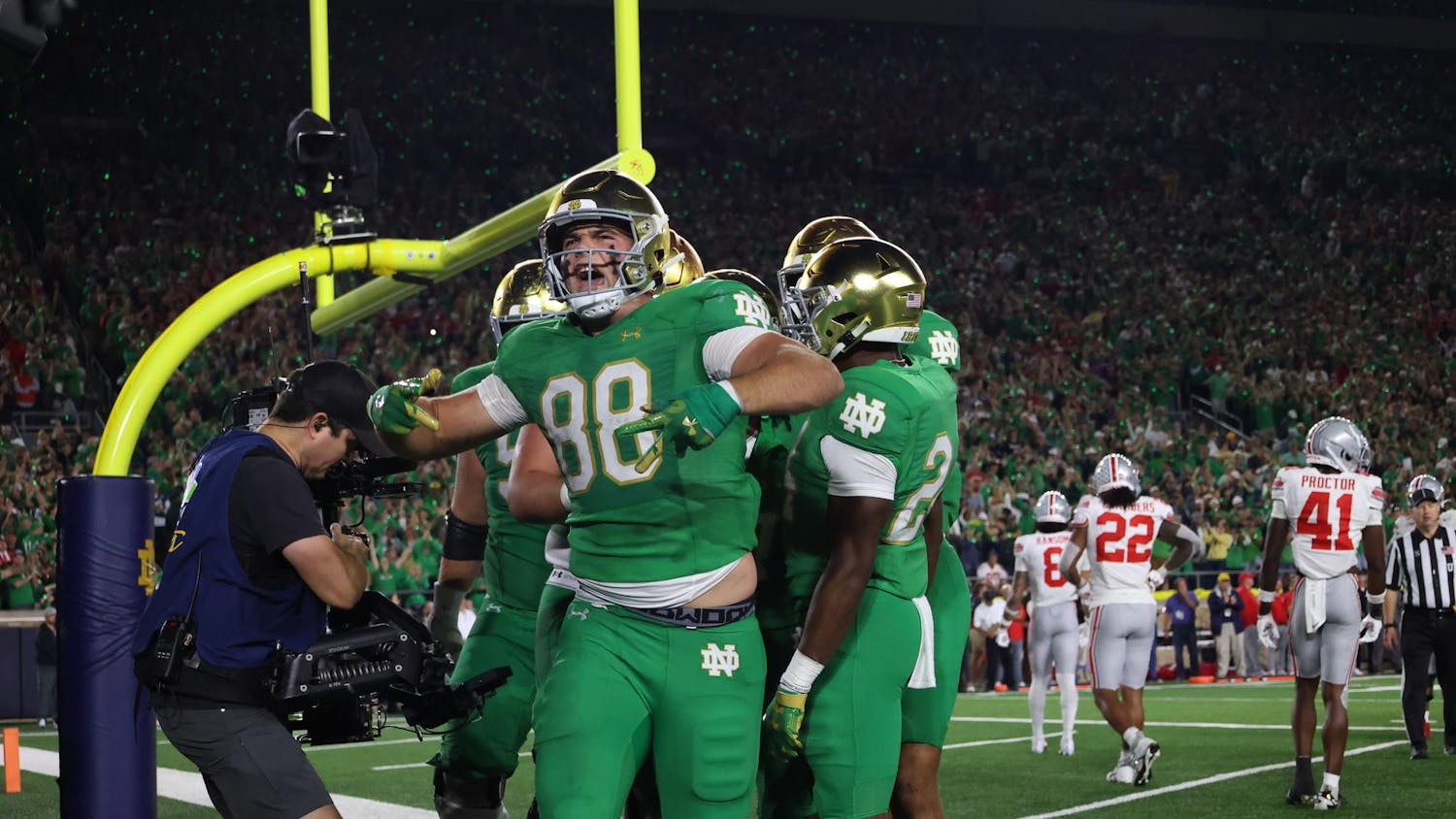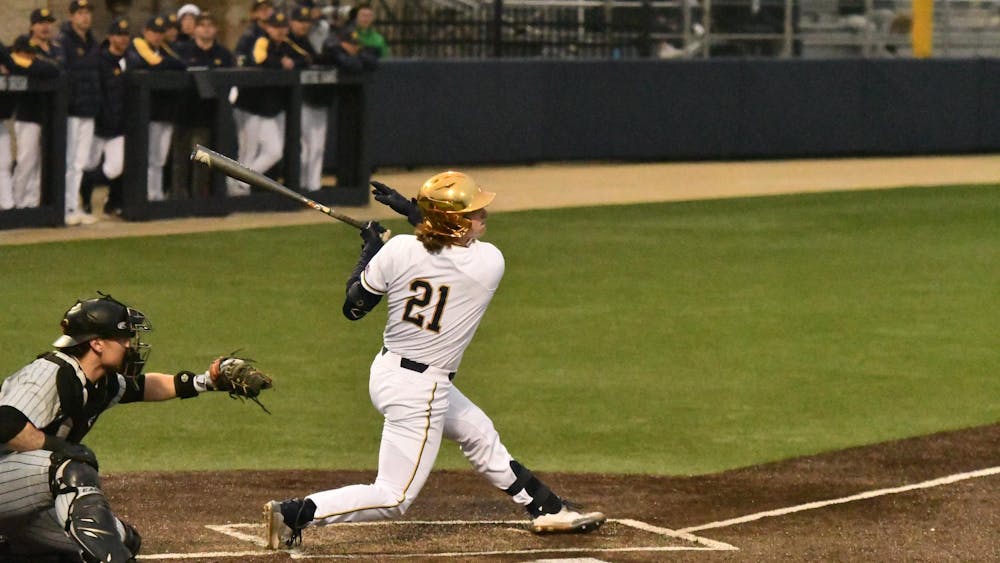Notre Dame Director of Athletics Jack Swarbrick is a busy man. But in the past semester, Swarbrick has been especially busy. There was a BCS National Championship Game, the MantiTe'o saga, the move to the Atlantic Coast Conference (ACC), proposed renovations to Notre Dame Stadium and the contract extension with NBC.
The Observer sat down during finals week with Swarbrick, who said while all the major events were finalized over the span of a few months, decisions such as the NBC deal and the Stadium renovations are really the product of years of work.

"You know, it's hard to distinguish them because if you take the big things - the BCS, conference realignment, the NBC deal, the Stadium - they've all sort of played out over a two-and-a-half to three-year period," Swarbrick said. So it's hard to draw distinctions between one six months of that and another. It has been an incredibly dense few years. Counting on it not being that way next year."
Changes to Notre Dame Stadium
On May 2, the University announced it was exploring the feasibility of turning Notre Dame Stadium into "a hub for, among other possibilities, a student center, media center and classroom and conference center." The feasibility study is expected to take between six and nine months.
"Well, the feasibility study is really important because there is a lot we don't know," Swarbrick said. "It's conceptual at this point. But the momentum and the enthusiasm is real. People are excited about the concept. They recognize the various needs that are being addressed, so I'm very optimistic about it, but from concept to final implementation, [the process] always contains things you can't anticipate right now."
Swarbrick said he and Executive Vice President John Affleck-Graves were the two different forces who came together in constructing the stadium plan. While Affleck-Graves was more focused on locating university assets, Swarbrick said he was concerned with maximizing the value of Notre Dame Stadium as a piece of real estate.
"One [factor] was my interest in addressing various issues with the Stadium but recognizing, principally driven by the notion that we had to make it more of a year-round facility," Swarbrick said. "And as campus has grown up around the Stadium, you can't afford this real estate and not use it. And so that was the starting point for me from which over the past few years I've been sort of going down this path."

Swabrick's views coupled with Affleck-Graves' preferences, and the two processes came together "in a great Notre Dame way," according to Swarbrick.
New videoboard in the Stadium?
While Swarbrick acknowledged fans and alumni are eager to hear about the possibility of adding a videoboard to the stadium, he said the process is not nearly that far along at this point.
"I know people love to talk about videoboards or suites or playing surfaces," Swarbrick said. "None of that is addressed in this at this moment. We're more focused on the use concepts. Will we build a stadium where we can communicate more effectively with fans as we do this renovation? Sure. Absolutely. What form that takes ... Is our focus broadband? You all will be bringing devices into the stadium that you want us to serve, what role does broadband play? What role does video play? How do these things fit together? That's all ahead of us here. We've made no decisions."
Swarbrick did say he believes the Shamrock Series games have converted many of those fans who were initially opposed to putting a videoboard inside the historic stadium. Those fans, Swarbrick said, now realize the boards are about endorsing Notre Dame and telling its story as opposed to pursuing commercial interests.
Football success and its NFL implications
In the days after Notre Dame's loss to Alabama in the BCS National Championship Game, reports surfaced and rumors swirled about the possibility of Irish head coach Brian Kelly jumping ship to the NFL with the Philadelphia Eagles. Throughout the whole process, however, Swarbrick said he was entirely comfortable with the communication between the involved parties and confident Kelly would return to Notre Dame.
"It worked very much the way I would have wanted it to," Swarbrick said. "Really good communication between Brian and I. Good communication between the Eagles and I, both of which you would hope happen and did in this case.
"So I was very comfortable with the process and I know it caused some of our fans and supporters discomfort, but I not only had confidence in the outcome, but I think your most committed employees are the employees who know they have the freedom to explore other opportunities. It's not limited to coaches. It's true of everyone. So throughout I was very comfortable with how it was handled."
Conference affiliation and scheduling
When Notre Dame finalized its move to the ACC on March 12, the immediacy of the transition - the Irish will play in the conference beginning next season - made scheduling incredibly difficult, Swarbrick said.
Swarbrick said football scheduling, in particular, has been challenging as Notre Dame balances its independence as well as its five-game ACC commitment.
"We're in a different position than anyone has ever been in, because when everybody else has had some change in affiliation, they're just swapping one conference schedule for another conference schedule," he said. "And then you just have to worry about the three other or four other games they have. All 12 of our games are independently-contracted games, so it has a complexity to it that's hard to describe to people and hard for people to appreciate.
"You take on a five-game commitment from the ACC - which we think is absolutely the right solution - you've got 12 potential schools that are impacted by trying to make those five games fit in and work. It's complicated."
The complications begin in 2014, when Irish football is scheduled for five games with ACC opponents. Notre Dame reportedly has lined up a 2014 matchup with Florida State, which could force the Irish to drop their scheduled game with Arizona State.
Arizona State athletic director Steve Patterson has been critical of Notre Dame's handling of the ongoing situation, but Swarbrick declined to delve into any specifics.
"I'm going to avoid the specifics of it for exactly the reasons I said: You can't predict any one of [the 12 game slots] without having conversations with three other schools," Swarbrick said. "We're working to try and be good partners and protect relationships, but it's very complicated. At the end of the day, it's hard to imagine a result where everybody is happy."
If and when a slot does open up, Swarbrick said Notre Dame would love to schedule an annual matchup with an SEC foe.
"Yeah, we'd like to because we think that would be good for the program," Swarbrick said. "But at the same time, we're - in the near years of this commitment, it's going to be really hard we just have more teams than we have slots right now, so we've got to work through sort of the contracts that are in place. But we would very much like to figure out how to play an SEC team, different teams from the conference once a year."
Student seating policy
On April 17, the Leprechaun Legion announced it would be launching a new seating policy for students at football games. Swarbrick said he played no role in consummating the new general admission policy, which has drawn the ire of many students on campus.
"I must say I haven't been engaged in that but I'm not trying to avoid the issue it's just I wasn't," he said.
Swarbrick said former senior athletics director for guest relations and event marketing Josh Berlo managed the discussion with the Leprechaun Legion. Berlo was named the athletic director at the University of Minnesota-Duluth on April 3 and began his new job May 1.
As for feedback on the new plan, Swarbrick said if there has been negative reaction, none has been directly brought to his attention.
Basketball practice facility
Swarbrick said neither the move to the ACC nor the proposed football stadium expansions have changed anything regarding a basketball practice facility. According to Swarbrick, the facility remains a priority.
"We did some site visits to understand the magnitude of what we thought we wanted to create," Swarbrick said. "We've had some preliminary discussions about what it would look like and where it might go. But we haven't started having conversations with people who might be interested in supporting it."
Swarbrick said securing funding is the next step in the process. The university's building policy requires 100 percent of the money to be committed and 75 percent to be "in hand" before any more progress can be made, Swarbrick said.
From the site visits, Swarbrick said he learned two keys to a practice facility are having plenty of space and being in close proximity to the gameday arena.
The building would have equal facilities for both the men's and women's squads in order to avoid odd practice times.
Editor-in-Chief Andrew Gastelum contributed to this report.
Contact Mike Monaco at jmonaco@nd.edu












